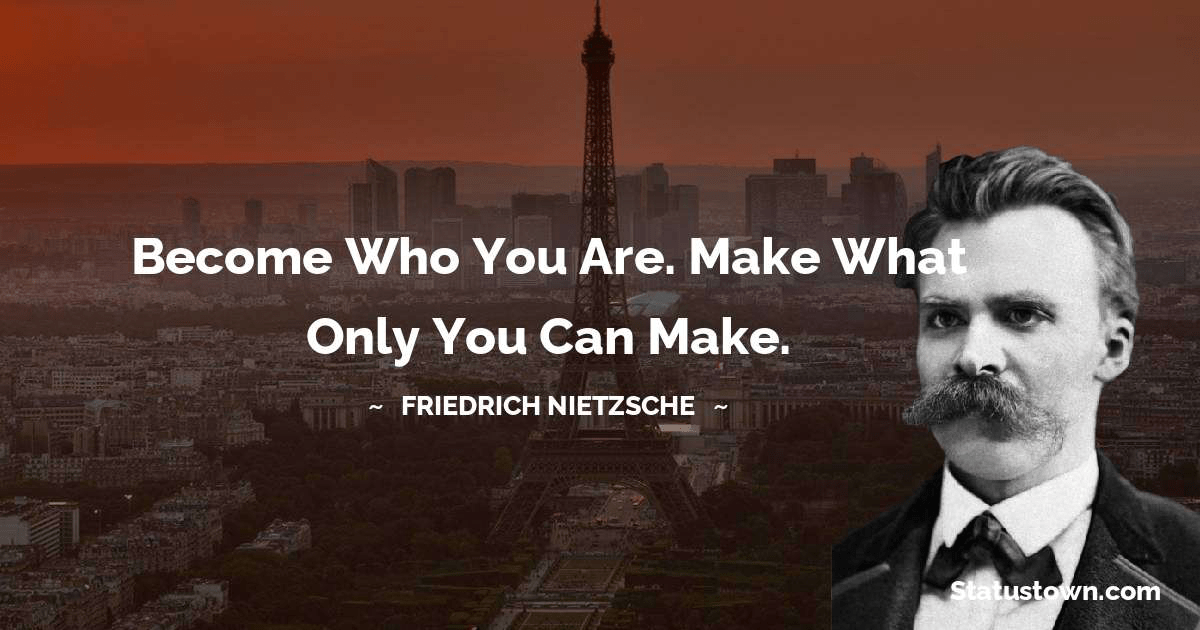Modern psychology reinforces this emphasis on authenticity. Research shows that people are happier and more motivated when they have a strong sense of self-efficacy and feel in control of their destinies.
However, too often we succumb to external validation and shallow goals defined by others, losing touch with who we genuinely are. What does it truly mean to become who you are? This profound question has consumed philosophers and psychologists alike in the pursuit of self-realization.
Nietzsche’s Superman ideal encapsulates the courageous spirit of those who fully harness their talents to become the authors of their lives. He offers a penetrating insight into this inquiry. As a clinical psychologist who has counseled patients struggling to find their purpose, I have found Nietzsche’s ideas immensely revelatory.
“What does your conscience say? — You shall become the person you are.”
-Nietzsche
Nietzsche contended that the path to fulfillment requires breaking free from societal conditioning and herd mentality. He provocatively declared “God is dead” — meaning that humans can no longer derive values from religious or institutional authority alone. We must look inward to sculpt our own unique potential. Through constant self-overcoming and transcendence of mediocrity, we can unleash our highest selves.
As Nietzsche knew, this quest for self-mastery is arduous, requiring us to challenge endemic conformity. But it is our struggle against complacent inertia that lets us truly come alive. When we sculpt ourselves each day, eroding old habits and assumptions, we can unlock our hidden potential.
I invite you to reflect deeply on your unique talents and what fulfills you. The obstacles you overcome in realizing your possibilities are what allow you to become who you are meant to be. It is an endless journey of discovery — but one that promises a life lived to its utmost depths.
“You have no idea what you are experiencing; you run through life as if you were drunk and once in a while fall down a staircase.”
-Nietzsche
For Nietzsche, becoming who you are requires constant self-overcoming and growth. He emphasized that life was not about finding yourself but creating yourself anew each day. We have to keep pushing past comfortable habits and assumptions to unlock new aspects of ourselves. It’s an endless process of discovery and striving.
The path to unleashing your true self requires courage, creativity, and an openness to explore your untapped potential. It may involve going against social norms and reevaluating your beliefs. But Nietzsche argued that this struggle leads to a more authentic, fulfilled existence. His philosophy serves as inspiration for anyone seeking to become the best version of themselves.
In this blog, we will explore Nietzsche’s concept of embracing your true identity and living authentically, drawing insights from his influential works such as “Thus Spoke Zarathustra” and “The Gay Science.” Prepare for a journey through Nietzsche’s philosophy as we analyze his ideas on the undoing of self-knowledge, the process of self-becoming, and the pursuit of one’s own values.
“A person is far more likely to appear to have sound character because he persistently follows his temperament than because he persistently follows his principles.”
-Nietzsche
Through practical guidance and in-depth analysis, we will navigate the complex terrain of Nietzsche’s philosophy, shedding light on how it can inform our quest for self-discovery.
Are you ready to break free from societal expectations and uncover your true self? Join us as we dive into Friedrich Nietzsche’s profound philosophy on becoming who you are.
Nietzsche: What Does It Mean To Become Who You Are?
Nietzsche believes that the process of becoming who you are involves a transformative journey of self-discovery and self-creation. It goes beyond conforming to societal expectations and breaking free from the masks we wear. According to Nietzsche, becoming who you are requires a courageous act of embracing your authentic identity, free from external influences and cultural norms.
“We want to understand who we are, to correct error, to avoid deceiving ourselves, to get beyond comfortable falsehood”
-Nietzsche
In his famous quote, Nietzsche states, “I teach you the overman. Man is something that shall be overcome.” These words encapsulate his philosophy on self-becoming. Nietzsche challenges individuals to transcend their limitations, liberating themselves from the constraints of conventional thinking and embracing the full potential of their existence.

To Nietzsche, becoming who you are is not a fixed destination, but an ongoing process. It requires relentless work, self-reflection, and a constant questioning of one’s values and beliefs. It entails the constant shedding of societal expectations and embracing the individual experience.
“Believe me! The secret of reaping the greatest fruitfulness and the greatest enjoyment from life is to live dangerously”
-Nietzsche
In his exploration of the concept of self-becoming, Nietzsche was ahead of his time. His ideas on personal growth and authenticity continue to resonate with individuals seeking a more fulfilling and purposeful life. Nietzsche’s philosophy invites us to live a life true to ourselves, unapologetically embracing our unique identities and discovering our own paths to self-actualization.

Behind the Philosopher’s Cryptic Phrase
Nietzsche believed that true self-creation required a profound understanding of oneself and a willingness to challenge societal norms and expectations. By stripping away the layers of external influences and societal masks, individuals can uncover their authentic identities. This process demands self-reflection, introspection, and a relentless commitment to personal growth.
“What I call ‘becoming’ is the production of a new world out of the old.”
-Nietzsche
In Nietzsche’s view, the journey towards becoming who you are is not a linear path but rather an ongoing process. It involves constant questioning, self-examination, and the willingness to confront discomfort and uncertainty. Nietzsche emphasized the importance of individual agency in shaping one’s destiny, urging individuals to take control of their lives and embrace their unique potentials.

The cryptic phrase, “becoming who you are,” encapsulates Nietzsche’s belief that true fulfillment lies in embracing one’s authentic self, free from the shackles of conformity and external expectations. It calls upon individuals to embark on a transformative journey of self-discovery, where they can unlock their true potential and live a life aligned with their deepest values and desires.
“Many are stubborn in pursuit of the path they have chosen, few in pursuit of the goal”
-Nietzsche
Nietzsche placed great emphasis on authenticity and the need to live in alignment with our true nature. He saw the pursuit of external validation and conformity as obstacles to self-actualization. Instead, he encouraged individuals to embrace their uniqueness and pursue a path that resonates with their own values and strengths.

It requires confronting our fears, doubts, and limitations, as well as engaging in relentless internal work. Only through this introspective journey can we discover our true potential and uncover the depths of our authentic selves.
Embracing Nietzsche’s philosophy on becoming who we are necessitates a commitment to self-discovery and personal growth. It invites us to question the conventional narratives and norms that shape our lives, and instead, forge our own values, ideals, and purpose. By doing so, we can lead lives defined by authenticity, passion, and a deep sense of fulfillment.
“The surest way to corrupt a youth is to instruct him to hold in higher esteem those who think alike than those who think differently”
-Nietzsche
Nietzsche’s Concept Of Self-Creation
Nietzsche challenges the traditional notions of fixed identities imposed by society and emphasizes the importance of embracing our authentic selves. It requires us to strip away the masks we’ve been forced to wear, shedding societal expectations and norms. By doing so, we can uncover our true identities and live authentically.
“Self-discovery is the most difficult journey that human beings have to take, which confirms that life is a means to knowledge.”
-Nietzsche
Nietzsche’s perspective on self-creation goes beyond mere conformity and encourages individuals to question and redefine their values, beliefs, and desires. His philosophy presents a transformative process that breaks free from the constraints of external influences and allows individuals to actively shape their own identities.

“And life confided the secret to me: behold, it said, l am that which must always overcome itself.”
-Nietzsche
Nietzsche’s Critique of Conformity and Herd Mentality
In Nietzsche’s critique of conformity and herd mentality, he highlights how these societal pressures can hinder individuals from truly becoming who they are. He argues that conformity stifles creativity and individuality, as it promotes a homogenous and unoriginal way of living.
By conforming to societal norms and expectations, people are often discouraged from exploring their unique identities and are instead encouraged to fit into predefined roles and molds.
“Only when we really know who we are, can we accomplish what we want and actually become who we are.”
-Nietzsche
In comparison, Nietzsche’s philosophy encourages individuals to resist conformity and embrace their own authentic selves. He believes that true self-creation requires breaking free from the constraints of societal expectations and embracing one’s own values and desires. While conformity may offer a sense of acceptance and belonging, Nietzsche argues that it ultimately leads to a sense of emptiness and suppression of one’s true potential.

By questioning the ideals and norms imposed by society, individuals can discover their own unique paths to self-actualization. Nietzsche’s philosophy invites us to challenge the herd mentality and live a life true to ourselves, even if it means going against the grain. He believes that true fulfillment and self-actualization can only be achieved by embracing our individuality and questioning the status quo.
“Few are made for independence — it is a privilege of the strong”
-Nietzsche
Critique of Pity — Nietzsche saw pity as demeaning to the recipient and pessimistic.
Nietzsche argued that by feeling pity towards someone, we inadvertently reinforce their weaknesses and undermine their ability to rise above their circumstances. It diminishes the agency and self-reliance necessary for personal transformation. It perpetuates a sense of victimhood and encourages individuals to rely on external support rather than their own inner strength.

By rejecting the notion of pity, Nietzsche challenges us to embrace a more empowering perspective on personal growth. Instead of seeing ourselves as victims of circumstance, we are urged to view life’s challenges as opportunities to cultivate resilience and forge our own destinies.
“I want to create for myself a sun of my own.”
-Nietzsche
Nietzsche saw pity as demeaning and pessimistic, as it implies a sense of superiority on the part of the one who pities and a sense of helplessness on the part of the recipient. According to Nietzsche, pity undermines individual agency and perpetuates a victim mindset.

In comparison, Nietzsche’s philosophy promotes a sense of empowerment and self-determination. He emphasizes the importance of taking responsibility for our own lives and shaping our own destinies.
By rejecting pity, individuals can free themselves from the limitations imposed by external judgments and expectations, allowing them to fully embrace their authentic selves and pursue a fulfilling life aligned with their true desires and values.
“How can the human being know itself? It is a thing dark and veiled; and if the hare has seven skins, the human can slough off seventy times seven and still not be able to say, ‘Now that is what you really are, that is no longer outer shell.’”
-Nietzsche
Nietzsche’s critique of pity aligns with his overall philosophy of self-actualization and the importance of embracing our authentic selves. By discarding pity, we can free ourselves from the confines of external judgments and expectations. It allows us to fully embrace our individuality, strengths, and weaknesses, and take ownership of our own personal growth.
“To those human beings who are of any concern to me I wish suffering, desolation, sickness, ill-treatment, indignities — I wish that they should not remain unfamiliar with profound self-contempt, the torture of self-mistrust, the wretchedness of the vanquished: I have no pity for them, because I wish them the only thing that can prove today whether one is worth anything or not — that one endures.”
-Nietzsche
Critique of Equality — Nietzsche rejected egalitarianism, believing it stifles excellence.
Nietzsche’s critique of equality stems from his belief that it stifles excellence and hinders individuals from reaching their full potential. He argues that the pursuit of equality, in all aspects of life, ultimately leads to mediocrity and a leveling down of greatness.
“I undertook something that not everyone may undertake: I descended into the depths, I bored into the foundations.”
-Nietzsche
According to Nietzsche, true greatness and excellence are achieved through the cultivation of individual strengths and the development of unique talents. However, the concept of equality promotes a standardized approach that disregards individual differences and diminishes the pursuit of excellence. By prioritizing equal outcomes and suppressing individual differences, Nietzsche argues that society undermines the very qualities that make individuals exceptional.

In Nietzsche’s view, the pursuit of equality often results in a herd mentality where mediocrity is celebrated and extraordinary achievements are devalued. This collective mindset reduces individuals to the lowest common denominator, preventing them from fully exploring and expressing their unique abilities. By aiming for equality, society limits the possibilities for personal growth and self-actualization.
“To live is to suffer, to survive is to find some meaning in the suffering.”
-Nietzsche, The Gay Science
Instead of emphasizing equality, Nietzsche advocates for a merit-based system where individuals are rewarded based on their individual talents and efforts. He argues that this approach not only promotes excellence, but it also allows individuals to fully embrace and express their own individuality.
Nietzsche believes that true fulfillment and self-actualization can only be achieved when individuals are given the freedom to pursue their own unique paths to greatness, rather than being confined to the limitations of an egalitarian framework.
To further illustrate Nietzsche’s critique of equality, let’s consider the example of a competitive sports team. In an egalitarian society, where everyone is expected to have equal playing time and opportunities, the concept of excellence and individual talent can be overshadowed.
Imagine a basketball team where the coach is more concerned with ensuring equal playing time for all players, rather than recognizing and nurturing the unique skills of each individual. In this scenario, the team may not reach its full potential because certain players who have exceptional shooting or defensive abilities are not given the opportunity to fully utilize their talents.
“He enters a labyrinth, and multiplies a thousand fold the dangers that life in itself brings with it — of which not the least is that nobody can see how and where he loses his way, becomes solitary, and is torn to pieces by some cave-minotaur of conscience.”
-Nietzsche
Nietzsche would argue that a merit-based approach should be adopted instead. By allowing players to showcase their individual strengths and focusing on developing their specific talents, the team can excel in different areas and achieve a higher level of success. This approach acknowledges and celebrates the differences among team members, recognizing that greatness comes from embracing and nurturing individual abilities, rather than striving for a forced equality.

In this example, Nietzsche’s philosophy highlights the importance of recognizing and cultivating individual excellence. By rejecting the notion of equality as a goal in itself, and instead prioritizing the pursuit of greatness through individual talent and effort, individuals can truly embrace their authentic selves and reach their full potential.
“I was in darkness, but I took three steps and found myself in paradise. The first step was a good thought, the second, a good word; and the third, a good deed.”
-Nietzsche
Art and Aesthetics: Expressing the Authentic Self
According to Nietzsche, art has the power to transcend the limitations of everyday life and tap into the deeper desires and passions of the individual.
In Nietzsche’s view, art allows us to communicate our innermost thoughts and emotions in a way that goes beyond conventional language. Through art, we are able to tap into our creative instincts and express our unique perspectives on the world. This creative process is essential for self-realization and personal growth.
“What he wanted was totality…he disciplined himself to wholeness, he created himself.”
-Nietzsche
By engaging with art, whether it be through painting, writing, music, or any other form, we are able to connect with our innermost selves and explore the depths of our being. Art provides a space for self-reflection and introspection, allowing us to better understand who we truly are and what we value in life.

Additionally, Nietzsche highlights the importance of aesthetics in shaping our perception of the world. Aesthetics refers to our sense of beauty and our ability to appreciate and recognize it in various forms. Nietzsche argues that our ability to appreciate beauty is indicative of our ability to embrace our authentic selves.
By cultivating a sense of aesthetics, we are able to recognize and appreciate the uniqueness and individuality in ourselves and others. This recognition of beauty, whether it be in nature, art, or human behavior, allows us to celebrate the diversity and richness of the world.
“At the bottom of us, really “deep down,” there is, of course, something unteachable, some granite of spiritual fatum [personal fate or destiny], of predetermined decision and answer to predetermined selected questions. Whenever a cardinal problem is at stake, there speaks an unchangeable “this is I.”
-Nietzsche
To further illustrate the transformative power of art in self-creation, let’s consider the example of a young woman named Sophia. Sophia grew up in a small town where creativity was not encouraged or valued. Despite feeling a deep passion for painting, she suppressed her artistic desires for many years, conforming to the expectations of those around her.

One day, while visiting a local art gallery, Sophia came across a breathtaking painting that struck a chord within her. The colors, the brushstrokes, and the emotions conveyed on the canvas spoke directly to her soul. It was as if the painting itself had awakened something dormant within Sophia, igniting a fiery passion for art.
“He who cannot obey himself will be commanded. That is the nature of living creatures.”
-Nietzsche
Inspired by this experience, Sophia decided to embrace her artistic talents and take up painting seriously. She enrolled in art classes, spent hours practicing her skills, and poured her heart and soul into each masterpiece she created.
“There is a false saying: “How can someone who can’t save himself save others?” Supposing I have the key to your chains, why should your lock and my lock be the same?”
-Nietzsche
Through the act of painting, Sophia found an avenue for self-expression and personal growth. She discovered that her paintings were not just simple renditions of landscapes or still-life objects, but rather reflections of her innermost thoughts, emotions, and experiences. Each brushstroke became a brushstroke of her authentic self.

As Sophia continued to explore her artistic abilities, she also began to gain recognition for her talent. Her paintings were showcased in local exhibitions, and she started to receive commissions from art enthusiasts who were moved by the raw beauty and passion in her work.
“No one can construct for you the bridge upon which precisely you must cross the stream of life, no one but you yourself alone.”
-Nietzsche
The Role of Pain and Suffering in Nietzsche’s Philosophy
Nietzsche believed that pain and suffering were inevitable aspects of human existence, and rather than seeking to avoid them, we should embrace these experiences as opportunities for growth and self-discovery.
“What is called ‘becoming’ I call the great process of self-overcoming.”
-Nietzsche
According to Nietzsche, pain and suffering have transformative power because they force us to confront our limitations, question our beliefs, and challenge the status quo. In the face of adversity, we are pushed to question our values, reassess our goals, and redefine our understanding of ourselves.

Nietzsche argued that it is through the experience of pain and suffering that we can truly understand and appreciate the depths of our own resilience and strength. By enduring and overcoming hardships, we develop a sense of self-mastery and inner fortitude that allows us to face future challenges with greater confidence and tenacity.
“My solitude doesn’t depend on the presence or absence of people; on the contrary, I hate who steals my solitude without, in exchange, offering me true company.”
-Nietzsche
Moreover, Nietzsche believed that pain and suffering can act as catalysts for personal growth and self-realization. In moments of struggle, we are compelled to confront uncomfortable truths about ourselves and the world around us. This introspection and self-reflection can lead to profound insights and a deeper understanding of our innermost desires, values, and aspirations.
Nietzsche’s philosophy emphasizes that by embracing pain and suffering, we can harness their transformative power to shape our own identity and become who we truly are.
“For believe me! — the secret for harvesting from existence the greatest fruitfulness and the greatest enjoyment is: to live dangerously! Build your cities on the slopes of Vesuvius! Send your ships into uncharted seas! Live at war with your peers and yourselves! Be robbers and conquerors as long as you cannot be rulers and possessors, you seekers of knowledge! Soon the age will be past when you could be content to live hidden in forests like shy deer! At long last the search for knowledge will reach out for its due: — it will want to rule and possess, and you with it!”
-Nietzsche, The Gay Science
However, some may argue that Nietzsche’s emphasis on pain and suffering as catalysts for self-creation overlooks the potential negative effects these experiences can have on an individual’s well-being and mental health.
While it is true that adversity can provide opportunities for personal growth, it is important to recognize that not everyone is equipped to handle and learn from these challenging experiences.

For some individuals, pain and suffering may lead to feelings of hopelessness, despair, and even trauma. Instead of fostering self-understanding and resilience, these experiences can exacerbate existing vulnerabilities and leave individuals feeling overwhelmed and incapacitated. In such cases, the transformative power Nietzsche speaks of may be overshadowed by the negative impact of these hardships.
“Finding yourself is one of the most fundamental endeavors of life”
-Nietzsche
Furthermore, it is worth considering that not all forms of self-creation require or arise from pain and suffering. Many individuals are able to find their authentic selves through positive experiences, nurturing environments, and the exploration of their passions and talents. It is important to acknowledge and value different paths to self-discovery and not limit the concept to only those who have endured hardship.
“I hate who steals my solitude, without really offer me in exchange company.”
-Nietzsche
Perspectivism — Nietzsche rejected absolute truth, believing knowledge depends on one’s perspective.
According to Nietzsche, our understanding of reality is shaped by our unique experiences, biases, and interpretations. Each person perceives the world through their own lens, influenced by their cultural background, personal history, and social conditioning. Therefore, there can never be one ultimate truth that applies to all.
“No Price Is Too High To Pay For The Privilege Of Owning Yourself”
-Nietzsche
This principle of perspectivism has profound implications for our journey of becoming who we truly are. Nietzsche argues that by acknowledging the limitations of our own perspectives, we can free ourselves from the constraints of societal norms and predefined truths. Instead of conforming to external expectations, we are encouraged to explore and embrace our individual truths.

“The great man… is colder, harder, less hesitating, and without fear of ‘opinion’; he lacks the virtues that accompany respect and ‘respectability,’ and altogether everything that is the ‘virtue of the herd.’ if he cannot lead, he goes alone… he knows he is incommunicable: he finds it tasteless to be familiar… when not speaking to himself, he wears a mask. There is a solitude within him that is inaccessible to praise or blame.”
-Nietzsche
By recognizing that our perspectives are subjective and evolving, we open ourselves to new possibilities and a more authentic self. Nietzsche believed that embracing perspectivism allows us to challenge conventional wisdom, question established norms, and forge our own path towards self-realization.
“Praise is more obtrusive than a reproach.”
-Nietzsche
However, it is crucial to acknowledge the potential pitfalls of perspectivism. While embracing diverse perspectives can be empowering, it also introduces the risk of moral relativism and the erosion of universal ethical standards. Nietzsche himself acknowledged this danger and cautioned against falling into a nihilistic mindset.

When we recognize that our perspectives are shaped by our experiences, biases, and interpretations, we become aware that our understanding of reality is not objective or universal. Instead, it is unique to each individual. Nietzsche argued that this realization liberates us from conforming to external expectations and allows us to explore our individual truths.
“Let the critics go to hell”
-Nietzsche
By being open to different perspectives, we gain a broader understanding of the world and expand our own knowledge. Engaging with diverse viewpoints helps us challenge our own assumptions and biases, and it encourages us to consider alternative ways of thinking. This flexibility of thought promotes intellectual growth and encourages us to continually adapt and evolve.
However, it is essential to approach perspectivism with caution. Nietzsche himself warned against falling into a nihilistic mindset, where all perspectives are seen as equally valid and moral relativity prevails. While embracing subjectivity can be empowering, it is crucial to maintain a sense of moral responsibility.
This means that while there may not be one ultimate truth that applies to all, there are still universal ethical standards that we should adhere to. It is important to strike a balance between embracing subjectivity and maintaining a sense of moral responsibility
“Be your self! All you are now doing, thinking, desiring, is not you yourself.”
-Nietzsche
Imagine a scenario where a renowned expert in the field of psychology is presenting their research findings at a prestigious conference. The expert’s audience consists of fellow professionals and academics who are seeking to expand their knowledge and challenge conventional wisdom in their field.
In order to convince this expert audience, the content continues:
For instance, let’s say the expert’s research challenges long-standing theories on cognitive development in children. They argue that the traditional stages of cognitive development, as proposed by Piaget, may not be universally applicable and that individual experiences and cultural contexts play a significant role.
“I go in solitude, so as not to drink out of everybody’s cistern. When I am among the many I live as the many do, and I do not think I really think; after a time it always seems as if they want to banish myself from myself and rob me of my soul.”
-Nietzsche
By embracing perspectivism, the expert encourages their audience to question established norms and consider the potential limitations of Piaget’s theories. They highlight that our perspectives are shaped by biases, interpretations, and unique experiences, emphasizing that our understanding of reality is subjective and evolving.
“But the worst enemy you can meet will always be yourself; you lie in wait for yourself in caverns and forests. Lonely one, you are going the way to yourself! And your way goes past yourself, and past your seven devils! You will be a heretic to yourself and witch and soothsayer and fool and doubter and unholy one and villain. You must be ready to burn yourself in your own flame: how could you become new, if you had not first become ashes?”
-Nietzsche
The expert acknowledges Nietzsche’s caution against falling into a nihilistic mindset and stresses the importance of maintaining moral responsibility when approaching diverse perspectives. They urge their audience to balance subjectivity with universal ethical standards.
To further support their argument, the expert presents a case study involving children from different cultural backgrounds. By examining the cognitive development of these children within their specific cultural contexts, the study reveals that cultural factors significantly influence their cognitive abilities and milestones. This challenges the notion of universal stages proposed by Piaget and underscores the need for individualized perspectives.
The expert then discusses how engaging with diverse viewpoints has expanded their own knowledge and fostered intellectual growth.
“Out of damp and gloomy days, out of solitude, out of loveless words directed at us, conclusions grow up in us like fungus: one morning they are there, we know not how, and they gaze upon us, morose and gray. Woe to the thinker who is not the gardener but only the soil of the plants that grow in him.”
-Nietzsche
The Apollonian and Dionysian — Nietzsche saw creation as a fusion of order/reason and chaos/ecstasy.
The Apollonian and Dionysian dichotomy, proposed by Nietzsche, is derived from ancient Greek mythology. Apollo, the god of order, reason, and harmony, represents the Apollonian aspect, while Dionysus, the god of wine, ecstasy, and chaos, represents the Dionysian aspect.
“At the bottom, every man knows well enough that he is a unique being, only once on this earth; and by no extraordinary chance will such a marvellously picturesque piece of diversity in unity as he is, ever be put together a second time.”
-Nietzsche
In Greek theater, the Apollonian and Dionysian traditions were embodied in two different types of plays. The tragedy, which adhered to strict rules and structure, was considered Apollonian, while the comedy, which celebrated wild parties and indulgence, was considered Dionysian.

This dichotomy reflects Nietzsche’s belief that true self-creation involves a fusion of order and chaos, reason and ecstasy. It suggests that we need both aspects in our lives to fully embrace who we truly are.
“The individual has always to struggle to keep from being overwhelmed by the tribe”
-Nietzsche
The Apollonian aspect represents the rational, orderly, and structured part of ourselves. It emphasizes logic, control, and a disciplined approach to life. This aspect of our being seeks to create order out of chaos and strives for a sense of stability and predictability. It equips us with the ability to set goals, make plans, and adhere to societal norms.
On the other hand, the Dionysian aspect represents the irrational, passionate, and spontaneous part of ourselves. It embraces the chaotic, ecstatic, and instinctual elements of our nature. It encourages us to let go of control, step outside of our comfort zones, and experience life fully. The Dionysian aspect allows for creativity, intuition, and emotional vulnerability.
“In solitude the lonely man is eaten up by himself, among crowds by the many.”
-Nietzsche
According to Nietzsche, true self-creation involves a harmonious integration of these seemingly contradictory forces. It requires us to balance reason with passion, structure with spontaneity, and order with chaos. By embracing both the Apollonian and Dionysian aspects, we create a holistic approach to personal growth and self-expression.
“We don’t know ourselves, we knowledgeable people — we are personally ignorant about ourselves. And there’s a good reason for that. We’ve never tried to find out who we are. How could it ever happen that one day we’d discover our own selves? With justice, it’s been said that “Where your treasure is, there shall your heart be also.” Our treasure lies where the beehives of our knowledge stand. We are always busy with our knowledge as if we were born winged creatures — collectors of intellectual honey.”
-Nietzsche
Imagine a person who has spent their entire life strictly adhering to societal norms and adhering to a highly structured and orderly lifestyle. They have always followed a set routine, meticulously planned their days, and avoided any form of spontaneity or impulsive behavior. While they may have achieved some level of success and stability, they feel a sense of emptiness and lack of fulfillment.
“What do you plan to do in the land of the sleepers? You have been floating in a sea of solitude, and the sea has borne you up. At long last, are you ready for dry land? Are you ready to drag yourself ashore?”
-Nietzsche
One day, this person decides to step outside of their comfort zone and embrace their Dionysian side. They attend a music festival where they let loose, dance without inhibition, and allow themselves to fully experience the euphoria of the moment. In that moment of chaos and ecstasy, they discover a newfound sense of freedom and self-expression.
“He who does not know his own heart will never find his way.”
-Nietzsche
This experience awakens their creativity and allows them to tap into their inner passions and desires. They start exploring different artistic endeavors, taking risks, and pursuing activities that bring them joy and excitement. Their life becomes a fusion of structure and spontaneity, order and chaos.
As they continue to integrate the Apollonian and Dionysian aspects, they find that their true self begins to emerge. They no longer feel bound by societal expectations or limited by rigid norms. Instead, they embrace their unique individuality and embrace the full range of human experience.
“The struggle is inner. The struggle to find yourself is a much more difficult quest that requires a very different kind of sacrifice”
-Nietzsche
They come to realize that by embracing both order and chaos, reason and ecstasy, they are able to live a more authentic and fulfilling life.
How To Strip Away The Mask You’ve Been Forced To Wear
When it comes to embracing your true identity and living authentically, Friedrich Nietzsche’s philosophy offers valuable insights and practical guidance. He illuminates the masks we wear as individuals, which are often imposed upon us by societal expectations.
“I overcame myself, the sufferer; I carried my own ashes to the mountains; I invented a brighter flame for myself.”
-Nietzsche
These masks hinder our ability to embrace our true selves and live authentically. Nietzsche challenges us to break free from these constraints and strip away the mask that we have been forced to wear.
Here are some insights on how to embark on this transformative journey:
Embrace Self-Awareness
To strip away the mask, it is crucial to cultivate self-awareness. Take the time to reflect on your thoughts, emotions, and actions. Question the motives behind your choices and uncover the layers that have shaped your identity. By understanding the influences that have molded you, you can begin to separate yourself from external expectations.

“When a hundred men stand together, each of them loses his mind and gets another one.”
-Nietzsche
Challenge Societal Norms
Societal norms often dictate how we should behave, think, and even look. However, Nietzsche encourages us to question these norms and challenge their validity. Refuse to conform to societal pressures and pave your own path. Embrace the discomfort that may arise from going against the grain, knowing that it is a necessary step toward discovering your authentic self.
“The concept of greatness entails being noble, wanting to be by oneself, being able to be different, standing alone and having to live independently.” (Beyond good and evil)
-Nietzsche
Embrace Vulnerability
Strip away the mask by embracing vulnerability. Allow yourself to be seen and heard, even if it feels uncomfortable at first. Embracing vulnerability requires courage, but it opens the door to genuine connections and a deeper understanding of yourself.
“Admiration for a quality or an art can be so strong that it deters us from striving to possess it.”
-Nietzsche
Cultivate Authenticity
Authenticity is central to Nietzsche’s philosophy on self-creation. It involves aligning your actions and beliefs with your true values and desires. Take the time to evaluate the aspects of your life where you feel inauthentic and make the necessary changes to live in alignment with your true self.
Embrace Imperfections
Nietzsche emphasizes that embracing imperfections is essential in shedding the mask. Instead of striving for an unattainable ideal, embrace the uniqueness of your own being. Recognize that imperfections are what make us human and allow them to shape your journey of self-discovery.
“To live is to suffer, to survive is to find some meaning in the suffering.”
-Nietzsche
Rediscover Joy and Purpose
As you strip away the mask, rediscover the joy and purpose that comes from living authentically. Explore new passions and interests, surround yourself with supportive relationships, and engage in activities that bring you fulfillment.

By following these insights, derived from Nietzsche’s philosophy, you can begin to strip away the mask that society has imposed upon you. Embrace self-awareness, challenge societal norms, cultivate authenticity, embrace vulnerability, and embrace imperfections.
Rediscover joy and purpose as you embark on the transformative journey of becoming your true self. Remember, the path to self-discovery is unique to each individual, so embrace your journey with curiosity and openness.
“He who has a why to live can bear almost any how.”
-Nietzsche
Embrace Individuality
Embracing your true identity means embracing your individuality. Recognize that you are unique, with your own set of strengths, weaknesses, and passions. Embrace your individuality and celebrate the qualities that make you who you are.
Embrace Discomfort
Nietzsche believed that personal growth often comes from stepping outside of our comfort zones. Embrace discomfort and be open to new experiences and perspectives. This will allow you to expand your horizons and discover new aspects of your identity.
“Any human being who does not wish to be part of the masses need only stop making things easy for himself. Let him follow his conscience, which calls out to him: “be yourself! All that you are now doing, thinking, desiring, all that is not you.”
-Nietzsche
Cultivate Self-Acceptance
Embracing your true identity requires self-acceptance and self-compassion. Be kind to yourself and acknowledge that self-discovery is a lifelong process. Accept that you may make mistakes along the way and learn from them without judgment.
“When one has not had a good father, one must create one.”
-Nietzsche
Trust Your Instincts
Nietzsche encouraged individuals to trust their instincts and listen to their inner voice. Pay attention to your intuition and let it guide you towards decisions and choices that align with your authentic self.

Surround Yourself With Authenticity
Surrounding yourself with people who value authenticity can greatly support your journey of self-discovery. Seek meaningful connections and relationships with individuals who encourage you to be true to yourself.
“Do whatever you will, but first be such as are able to will.”
-Nietzsche
Nietzsche and Psychology: Insights on Self Overcoming
He believed that true self-actualization requires a profound understanding of one’s own desires, motives, and limitations. Nietzsche encouraged individuals to delve into their subconscious minds, exploring the depths of their psyche to uncover hidden truths and suppressed emotions.

“We have art so that we may not perish by the truth.”
-Nietzsche
The Power of Will and Self-Overcoming
Nietzsche viewed the will as a driving force behind self-becoming. He believed that individuals must have the courage to confront their fears, insecurities, and weaknesses to unleash their true potential. By embracing the challenges and obstacles that life presents, individuals can engage in self-overcoming and achieve personal transformation.
“There is one thing one has to have: either a soul that is cheerful by nature, or a soul made cheerful by work, love, art, and knowledge.”
-Nietzsche
Final Thoughts
Friedrich Nietzsche’s philosophy on becoming who you really are offers profound insights into the journey of self-discovery and the pursuit of authenticity. By delving into Nietzsche’s ideas, we can uncover key takeaways that can be applied to our own lives.
Nietzsche emphasizes the importance of self-creation and the need to strip away the masks we have been forced to wear. Society often imposes expectations on us, leading us to conform and suppress our true identities.
However, Nietzsche encourages us to break free from these constraints and embrace our unique selves. It is through this process of shedding societal expectations that we can start uncovering our true potential.
Furthermore, Nietzsche’s notion of self-becoming highlights the ongoing nature of the journey towards authenticity. It is not a static destination to be reached, but rather an ongoing process of personal growth and self-realization. Nietzsche urges us to constantly question and challenge our own values and beliefs, allowing for continuous self-reflection and self-improvement.
“You have your way. I have my way. As for the right way, the correct way, and the only way, it does not exist.”
-Nietzsche
To embrace Nietzsche’s philosophy in our lives, we can start by examining the masks we wear and the ways in which societal expectations have shaped us. By consciously recognizing and challenging these influences, we can begin to uncover our true identities and live in alignment with our own values and desires.
In conclusion, embracing Nietzsche’s philosophy on becoming who you really are requires relentless self-reflection, courage, and a commitment to authenticity. By following Nietzsche’s guidance, we can embark on a transformative journey towards self-discovery and personal growth, ultimately living a more fulfilling and authentic life.












